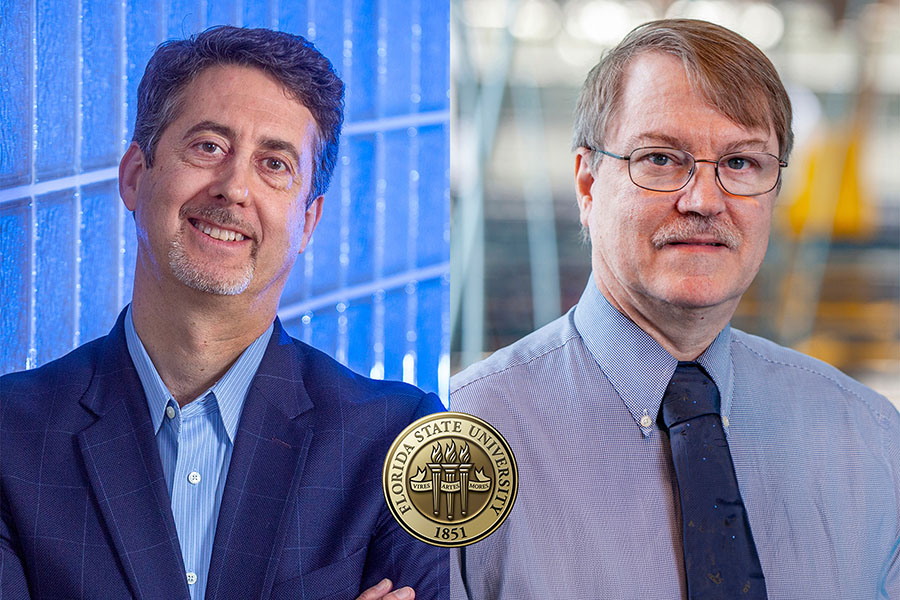
The chair of the FAMU-FSU Department of Chemical and Biomedical Engineering and a Florida State University professor of chemistry have been named Fellows of the National Academy of Inventors.
FAMU-FSU Chair and Professor of Chemical and Biomedical Engineering Bruce R. Locke and Robert O. Lawton Professor of Chemistry Joseph Schlenoff have been named Fellows of the academy, which highlights academic inventors who have demonstrated a spirit of innovation in creating or facilitating work that has made a tangible impact on the quality of life, economic development and welfare of society.
“Dr. Locke and Dr. Schlenoff are extraordinary examples of FSU researchers whose work has demonstrated significant application and impact to society,” said Vice President for Research Stacey Patterson. “We are so proud of their accomplishments and congratulate them on being named as part of the 2023 class of the National Academy of Inventors.”
Locke and Schlenoff join eight other FSU faculty members — including FSU President Richard McCullough — as fellows of the NAI.
“It’s a great honor in recognition of the work we’ve been doing,” Locke said. “It’s something that my group has worked on for many years. We have a great team of students and postdocs who have contributed to this as well. I’ve also had great colleagues from other universities, business and the federal funding agencies who have helped move these ideas forward.”
Locke has worked in the area of plasma technology for the past several years and holds 11 U.S. patents with additional applications in review. Several of his inventions involve the use of air and water with low-temperature plasma to generate nitrogen fertilizer for agricultural use to mitigate the environmental impact of growing food.
Locke, his former doctoral student Robert Wandell, and their partner Noel Munson co-founded a company, Redhills Scientific, to further explore how their technology, which is based upon contacting plasma with flowing gases and liquids, can be deployed in agriculture and environmental applications.
Schlenoff has patented 42 technologies over his career, including a robot that dips microscope slides into beakers sequentially to build up a thin film polymer. He also developed an anti-fouling coating that can be applied to ships to prevent plants, algae and marine animals such as barnacles from attaching themselves to the vessel and causing damage.
Schlenoff noted he was very happy to get the news, but also a bit surprised.
“It’s really rewarding when, number one, your colleagues are willing to nominate you and put the work into writing letters — it’s very nice of them,” Schlenoff said. “And number two, when a selection committee goes over an application and decides that you merit something like this, it’s a nice sort of affirmation of the time that you’ve put into writing all those patents and trying to do commercialization encouraging young people to do commercial startups.”
Since its inception in 2012, the NAI Fellows program has grown to include 1,898 exceptional researchers and innovators, who hold over 63,000 U.S. patents and 13,000 licensed technologies. Locke and Schlenoff are part of a class of 162 inventors from 118 research universities, governmental and non-profit research institutions worldwide. Collectively, the 2023 class holds more than 4,600 U.S. patents.
“This year’s class of NAI Fellows showcases the caliber of researchers that are found within the innovation ecosystem,” said Paul R. Sanberg, president of the NAI. “Each of these individuals are making significant contributions to both science and society through their work. This new class, in conjunction with our existing Fellows, are creating innovations that are driving crucial advancements across a variety of disciplines and are stimulating the global and national economy in immeasurable ways as they move these technologies from lab to marketplace.”
The 2023 class will be formally inducted at the 2024 Annual Conference on June 18, 2024, in North Carolina.




